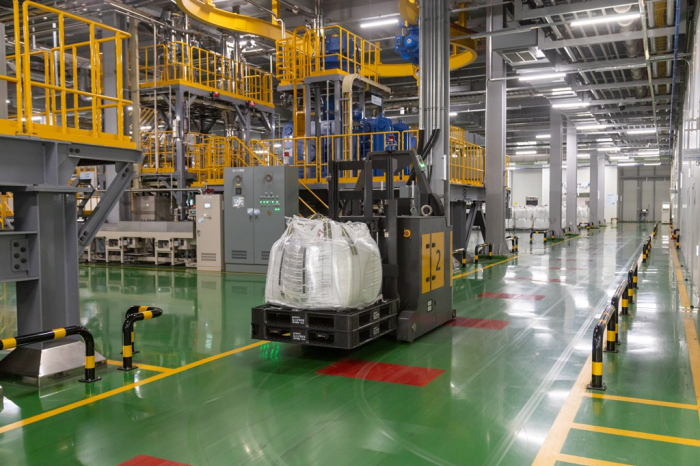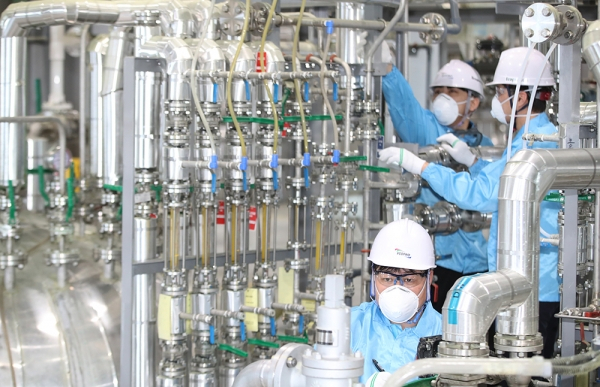Battery materials
Are Korean battery materials stocks too expensive?
With market capitalization nearly doubling so far this year, foreigners may sell Korean stocks and buy Chinese shares
By Oct 19, 2021 (Gmt+09:00)
3
Min read
Most Read
S.Korea's LS Materials set to boost earnings ahead of IPO process


CarlyleŌĆÖs Rubenstein sees commercial real estate undervalued


Samsung Electronics' key M&A man returns; big deals in the offing


Money pours in for technology to reshape Korean restaurants


CJ CheilJedang to sell feed, livestock unit for $1.4 bn



South Korean battery materials shares have rallied with their market capitalization nearly doubling since early January thanks to strong growth in the global electric vehicle market, but concerns are emerging over their valuations.
The countryŌĆÖs battery materials stocks have seen more than ten times the gains of their Chinese competitors since last month, prompting speculation that global investors may take a long-short equity strategy -- seeking to buy underpriced stocks while selling overpriced shares.
There is little doubt over the long-term growth potential in the secondary battery materials sector, but it's time for investors to manage short-term risk, analysts said.
MARKET CAPITALIZATION NEARLY DOUBLES
The market capitalization of South KoreaŌĆÖs top 10 battery materials companies totaled 63.6 trillion won ($54 billion) as of Oct. 18, according to the Korea Exchange data. That's nearly double the 36.3 trillion won on Jan. 4.
Shares in South KoreaŌĆÖs secondary battery sector, including stocks in cell makers and materials producers, jumped 28% on average to Oct. 18 from the beginning of September, according to Bloomberg. On the other hand, Chinese secondary battery stocks rose a mere 2% during the period.
ŌĆ£Stock price revaluation in the materials sector helped South Korean producersŌĆÖ stocks outperform their Chinese peers,ŌĆØ said Samsung Securities analyst Chang Jung-hoon.
South Korean battery materials stocks gathered momentum when EcoPro BM Co. won a near $9 billion order from SK Innovation Co. last month. The sector is also expected to increase production capacity, adding to hopes for its long-term growth potential.

Shares in POSCO Chemical and L&F Co. have each increased their market capitalization by 5 trillion won. L&F's stock price has more than tripled so far this year to close at 218,400 won on Oct. 19. POSCO ChemicalŌĆÖs shares have soared 55.8% to 162,000 won during the period.
LONG CHINA, SHORT KOREA
The share price jumps in such a short period have spurred worries about overvaluation.
The 2022 price-to-earnings ratio (PE ratio) for South Korean cathode materials makers, key players of overall battery materials producers, was estimated at 62 times on average, about double the 33 times of Chinese competitors, according to Samsung Securities.
That suggests investors need to manage risk since the Chinese EV market is rapidly growing.
ŌĆ£Korean cathode manufacturersŌĆÖ long-term growth heavily relies on Korean battery makers, while Chinese players are expected to see similar growth on hopes for higher demand stemming from capacity expansion by local battery clients,ŌĆØ SamsungŌĆÖs Chang said. ŌĆ£EV sales hit a record high last month in China.ŌĆØ
Concerns over valuations may cause foreign investors to sell South Korean secondary battery materials shares given their higher PE ratios and buy undervalued Chinese makersŌĆÖ stocks, analysts said. Such a strategy could affect short-term supply and demand in the stock market.
Still, some analysts are expecting South Korean battery materials stocks to rise further in the fourth quarter.
ŌĆ£Materials producersŌĆÖ earnings in the third quarter are predicted to be better than forecast. EV sales remained strong, while materials remained in short supply,ŌĆØ said Korea Investment & Securities analyst Kim Jung-hwan.
ŌĆ£Rising raw materials costs are being reflected in the products, so their earnings forecasts will escalate,ŌĆØ Kim added.
Write to Ji-Yeon Sul at sjy@hankyung.com
Jongwoo Cheon edited this article.
More to Read
-
 Battery materialsS.Korean battery materials makers see stock prices surge
Battery materialsS.Korean battery materials makers see stock prices surgeSep 26, 2021 (Gmt+09:00)
2 Min read -
 Battery materialsPOSCO Chemical to expand EV battery materials capacity in China
Battery materialsPOSCO Chemical to expand EV battery materials capacity in ChinaAug 25, 2021 (Gmt+09:00)
1 Min read
Comment 0
LOG IN


